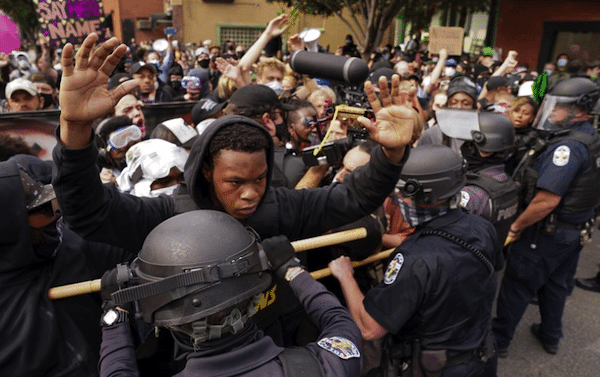In a fresh report released by the UN International Independent Expert Mechanism to Advance Racial Justice and Equality in the Context of Law Enforcement, it is revealed that “systemic racism” against individuals of African descent is ravaging U.S. police forces and the criminal justice system as it calls on authorities to amp up efforts of reform.
The report is the result of the Mechanism’s official visit to the United States earlier this year, in which it heard testimonies from 133 individuals impacted by it, visited five detention centers, and convened with civil society groups and a range of government and police authorities in the states of the District of Columbia, Atlanta, Los Angeles, Chicago, Minneapolis, and New York.
Tracie Keesee, an expert member of the Mechanism, said, “In all the cities we went to, we heard dozens of heart-breaking testimonies on how victims do not get justice or redress. This is not new, and it’s unacceptable,” adding,
This is a systemic issue that calls for a systemic response. All actors involved, including police departments and police unions, must join forces to combat the prevailing impunity.
According to the report, racism—the legacy of slavery, the slave trade, and 100 years of legalized apartheid—continues to spread today through racial profiling, police killings, and other human rights violations.
It noted that African Americans are three times more likely to be killed by police than whites, and 4.5 times more likely to be imprisoned, adding that only 1% of the over 1,000 cases of murder by police each year, result in officers being indicted.
Children in prison, pregnant women in chains
Juan Mendez, an expert member of the Mechanism, expressed rejection of the “bad apple” theory. There is strong evidence suggesting that the abusive behavior of some individual police officers is part of a broader and menacing pattern,” adding,
Law enforcement and criminal justice institutions in the United States share and reproduce values, attitudes, and stereotypes of U.S. society and institutions. These must be reformed.
The report proposed that armed police officers should not be sent as the first responders to every social issue in the U.S., such as mental health crises, homelessness, and controlling traffic or school discipline, which the report said could be changed by setting alternative responses to policing.
“During our meetings with police officers, we repeatedly heard concerns that officers’ mental health was being affected not only by work overload but also by racism and racial discrimination inside police departments,” Keesee clarified, stating,
Expecting law enforcement officers to respect and protect human rights also presupposes a culture of respect and wellbeing within the ranks.
Police agencies are called on by the authors of the report to tackle issues of systemic racism even against Black law enforcement officers and address white supremacy ideology inside the precincts.
The report cited examples of children of African descent sentenced to life imprisonment, pregnant women in prison put in chains while giving birth, and persons put in solitary confinement for 10 years.
Bad cop, good practices?
It also noted that some people of African descent were prohibited from voting even after years of completing their sentences and that some were given forced labor in “plantation-style” prisons—a contemporary form of slavery.
“The testimonies and figures we received represent the worst part of a racist criminal justice system that erodes all efforts towards addressing systemic racism,” Mendez said.
Our findings point to the critical need for comprehensive reform.
30 recommendations to the U.S. and all its jurisdictions, including over 18,000 police agencies in the country, were handed in the report, which underlined local and federal good practices required and recognized the efforts of the current administration and a few local governments to tackle the issue.
“We encourage the good practices to be reproduced in other parts of the country. We look forward to continuing to cooperate with the United States to implement these recommendations,” Mendez concluded.

